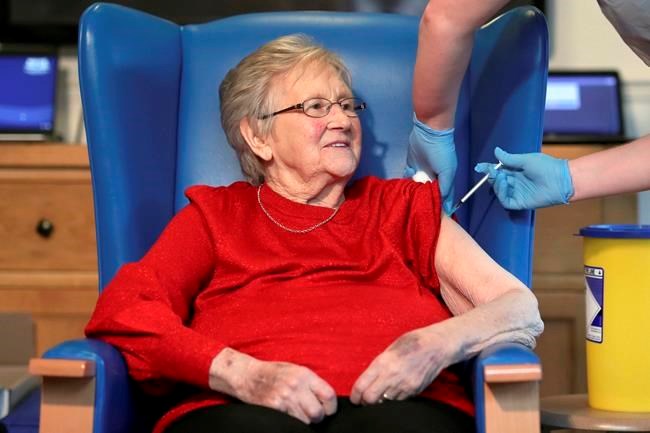OTTAWA — Canada is helping fund the creation of a new international system to help distribute any extra COVID-19 vaccines to poor countries, says International Development Minister Karina Gould.
“Canada is really is leaning into this space. The world is not at a point of donating excess capacity because we are just at the very beginning of vaccines getting approved,” Gould said in an interview after announcing of $485 million in new money toward the global effort to provide COVID-19 medicines to poor countries.
The new money marked one of Canada’s biggest-ever increases in spending on foreign aid, a budget that delivered $5.9 billion in official development assistance in 2018-2019.
Gould noted that a modest part of Canada's new investment, $5 million, was being directed at Gavi, the Vaccine Alliance, to help it set up a new “governance structure” to distribute extra vaccines in poor countries.
With the potential of more vaccine candidates winning regulatory approval in the coming months, she said, "we want to make sure that there is a system in place to facilitate that transfer of doses to the developing world."
Canada has secured guarantees for 214 million doses of vaccines, if all seven candidates it has agreements for prove safe and effective. It has also negotiated the potential to get another 200 million doses.
Last week, Oxfam Canada said Canada topped the list of rich countries that have pre-bought COVID-19 vaccines, having secured enough to cover its population five times over. Oxfam urged Canadians to show more compassion to poorer people.
On Monday, Oxfam Canada's interim executive director Kate Higgins said the organization was "pleased to see Canada take additional and ongoing leadership to ensure that everyone on the planet has access to the COVID-19 vaccine."
Higgins also said that "the only way we will get vaccines for everyone is for pharmaceutical corporations to openly share their technology and intellectual property. We hope Canada will continue to push for this as well."
The advocacy group One Campaign, which has criticized Canada's relatively low foreign aid spending in the past, offered effusive praise.
"As COVID vaccinations begin here, Canada is also showing global leadership in the fight to end the pandemic everywhere. Today's investment is Canadian compassion in action. It's also smart," said Stuart Hickox, the Canada director for One Campaign, noting that every $1 spent on aid would generate a $5.60 return to Canada's economy.
David Morley, the president of UNICEF Canada, said the new support from the federal government will ensure "no country is pushed to the back of the line" and the entire world will remain vulnerable until countries with the weakest health systems are protected from COVID-19.
Michael Messenger, president of World Vision Canada, said where a child is born shouldn't have an impact on whether they get access to a life-saving vaccine.
"This commitment will help to make sure that girls and boys living in the most fragile parts of the world benefit from the great work of some of the smartest people and latest technology."
Most of Canada's new spending is going toward the Access to COVID-19 Tools, or "ACT" Accelerator, which was created in April by the World Health Organization, the French government, the European Commission and the Bill and Melinda Gates Foundation.
The ACT Accelerator is part of a global effort to ensure low- and middle-income countries have equitable access to medical treatments during the pandemic.
It supports organizations, health professionals and businesses in their efforts to develop vaccines, as well as drug therapies and diagnostic tools to battle the pandemic.
Monday's announcement includes $255 million in additional support for the ACT Accelerator through "focused investments" in the World Health Organization, the Pan-American Health Organization, the Coalition for Epidemic Preparedness Innovations (CEPI) and Gavi, the Vaccine Alliance, which distributes vaccines in poor countries.
Canada has now committed more than $865 million to the ACT-Accelerator and has also pledged $220 million to its partner initiative, the COVAX Facility, to help buy vaccine doses for low- and middle-income countries.
Morley said UNICEF is aiming to purchase two billion vaccine doses for 171 countries through COVAX. "By positioning itself as the second-largest financial supporter of the COVAX Advance Market Commitment, the government of Canada has demonstrated that Canada understands that the global COVID-19 pandemic can only be defeated through a co-ordinated global response."
Earlier Monday, Gould also announced a five-year, $520-million commitment of previously budgeted money toward the global Nutrition for Growth project, which included $250 million toward the Ottawa-based organization Nutrition International.
Joel Spicer, president of Ottawa-based Nutrition International, said helping address malnourishment is "intricately connected" to emerging from COVID-19.
"You cannot have a strong immune system unless you have good nutrition. And a vaccine doesn't work as well in a body that has a suboptimal immune response," he said.
This report by The Canadian Press was first published Dec. 14, 2020.
Mike Blanchfield, The Canadian Press

